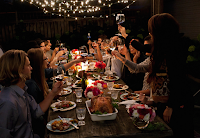 The Van Buren County SAFE Coalition would like to
encourage you to avoid making alcohol the main focus of social events this
holiday season. Entertain guests with music, dancing, games, food, and lively
conversation. Did you know that one in
three adults prefers a nonalcoholic beverage? Make sure to offer plenty of
nonalcoholic choices such as sparkling water, fancy juice drinks, soft drinks,
and bottled drinking water. Also provide
guests with nutritious and appealing foods to slow the effects of alcohol. High
protein and carbohydrate foods like cheese and meats are especially good. They
stay in the stomach much longer, which slows the rate at which the body absorbs
alcohol. Avoid salty foods, which encourage people to drink more.
The Van Buren County SAFE Coalition would like to
encourage you to avoid making alcohol the main focus of social events this
holiday season. Entertain guests with music, dancing, games, food, and lively
conversation. Did you know that one in
three adults prefers a nonalcoholic beverage? Make sure to offer plenty of
nonalcoholic choices such as sparkling water, fancy juice drinks, soft drinks,
and bottled drinking water. Also provide
guests with nutritious and appealing foods to slow the effects of alcohol. High
protein and carbohydrate foods like cheese and meats are especially good. They
stay in the stomach much longer, which slows the rate at which the body absorbs
alcohol. Avoid salty foods, which encourage people to drink more.
Require bartenders to measure the
correct amount of liquor into drinks (no doubles), and instruct them not to
serve anyone who appears to be impaired or underage. Have the bartender check
the ID of anyone who appears to be under the age of 30 (no ID, no alcohol). Stop serving drinks at least 1 hour before
the end of the event. Instead, serve
coffee, non-alcoholic beverages, and desserts at that time.
Your responsibility as a host is even
more important when the party is over. Be prepared to offer your guests alternate
forms of transportation, such as: Ask someone who was not drinking to drive a
guest home; Call someone to come and drive them home; Offer your place to spend
the night; If the person insists on driving despite his or her obvious
intoxication, take the keys, ask for help from other guests, or temporarily disable
the car; If all else fails, say you will call the police (and do so).
The following non-alcoholic drink
recipes are a courtesy of the National Highway Traffic Safety Administration
and Join Together, a national resource center for communities working to reduce
substance abuse. Many of these unique
drinks can add “flavor” to your party by giving your guests healthy, tasty
alternatives to alcoholic beverages. Enjoy!
Citrus
Collins
Fill a 10–12 oz. glass with ice cubes
2 oz. orange juice
1 oz. lemon juice
1 oz. flavored syrup
Fill with club soda. Garnish with an
orange slice or a cherry.
Mai
Tai
1/2 cup pineapple juice
1/4 cup orange juice
1/4 cup club soda
1 tbsp. cream of coconut
1 tbsp. grenadine syrup
In a shaker or tall glass, combine
ingredients; shake or stir to blend. Add
crushed ice.
Lemon-Strawberry
Punch
6 oz. frozen orange juice concentrate,
thawed
1 pkg. frozen sliced strawberries
6 oz. frozen lemonade concentrate
1 quart carbonated water
1 quart ginger ale
Sliced bananas
Sliced oranges or lemons
Combine frozen lemonade, strawberries
(half-thawed with juice), and orange juice. Place in a punchbowl with ice. Just
before serving, add carbonated water and ginger ale. Garnish with thin slices
of orange, lemon, or banana. Serves 20.
Holiday
Delight
Blend the following ingredients in a
mixer:
1/2 cup orange juice
1/4 cup frozen strawberries
1/4 cup cranapple juice
1/4 cup half-and-half
1/2 banana
Pour into a tall glass.
Viennese
Coffee
Combine:
1/4 cup whipped cream
1 tbsp. powdered sugar
1/2 tsp. vanilla extract
Beat until stiff. Pour 3 cups of very strong coffee
(decaffeinated is fine) into four cups. Float whipped cream mixture on top.
Garnish with 1/2 tsp. grated orange peel. Use cinnamon sticks in each cup as
servers.





